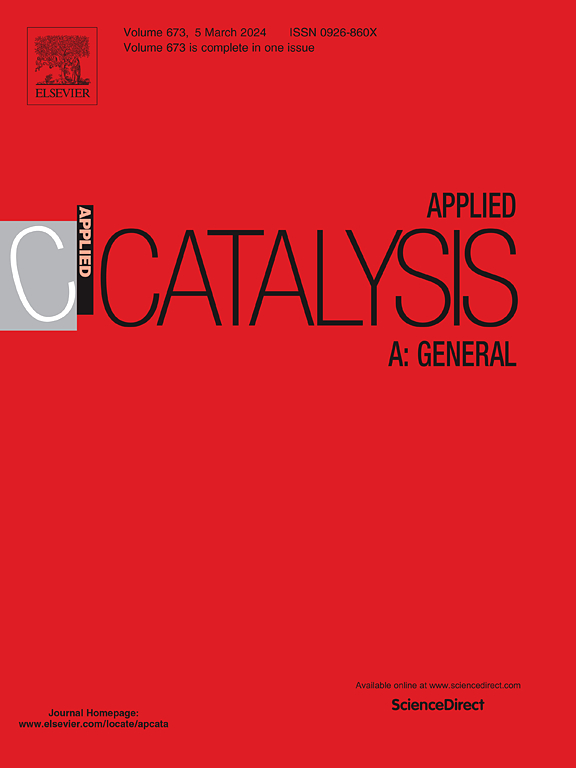铁基催化剂的表面改性促进高选择性线性α-烯烃在费托合成中的形成
IF 4.8
2区 化学
Q2 CHEMISTRY, PHYSICAL
引用次数: 0
摘要
费托合成(FTS)是非化石资源可持续生产化学品的关键技术。然而,设计适合产品分布的催化剂,特别是提高烯烃选择性的催化剂,仍然是一个持久的挑战。本文报道了一种含氧基团修饰的铁基催化剂Fe3O4/HEC(羟乙基修饰),该催化剂在没有任何碱金属促进剂的情况下在FTS中表现出非凡的催化性能。该催化剂具有较高的活性,对轻烯烃(C2-C4=)的选择性为41.36 %,O/P比为5.49。同时,C5+的选择性达到40.38 %(线性α-烯烃的选择性为68.2% %)。改性后的催化剂促进了铁碳化物的形成,促进了*CHx的偶联,促进了链的生长,同时抑制了二次加氢反应,这被认为是对烯烃和重烃具有高选择性的原因。本文章由计算机程序翻译,如有差异,请以英文原文为准。
Surface modification of Fe-based catalysts for promoting highly selective linear α-olefin formation in Fischer-Tropsch synthesis
Fischer-Tropsch synthesis (FTS) is a pivotal technology for sustainable production of chemicals from non-fossil resources. However, the design of catalysts to tailor product distribution, particularly to enhance olefin selectivity, remains an enduring challenge. Herein, we report an iron-based catalyst modified with oxygen-containing groups, Fe3O4/HEC (hydroxyethyl group-modified), which demonstrates extraordinary catalytic performance in FTS without any alkali metal promoters. This catalyst exhibits high activity, achieving 41.36 % light olefin (C2-C4=) selectivity and an O/P ratio of 5.49. Meanwhile, the C5+ hydrocarbon selectivity reaches 40.38 % (with 68.2 % linear α-olefins). The modified catalyst promotes the formation of iron carbides and facilitates the coupling of *CHx to promote chain growth while suppressing secondary hydrogenation reactions, which is considered to account for the high selectivity toward olefins and heavy hydrocarbons.
求助全文
通过发布文献求助,成功后即可免费获取论文全文。
去求助
来源期刊

Applied Catalysis A: General
化学-环境科学
CiteScore
9.00
自引率
5.50%
发文量
415
审稿时长
24 days
期刊介绍:
Applied Catalysis A: General publishes original papers on all aspects of catalysis of basic and practical interest to chemical scientists in both industrial and academic fields, with an emphasis onnew understanding of catalysts and catalytic reactions, new catalytic materials, new techniques, and new processes, especially those that have potential practical implications.
Papers that report results of a thorough study or optimization of systems or processes that are well understood, widely studied, or minor variations of known ones are discouraged. Authors should include statements in a separate section "Justification for Publication" of how the manuscript fits the scope of the journal in the cover letter to the editors. Submissions without such justification will be rejected without review.
 求助内容:
求助内容: 应助结果提醒方式:
应助结果提醒方式:


